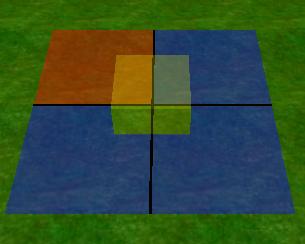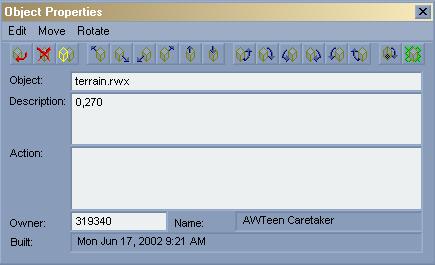|
Building with
Terrain
Modifying terrain with
Demeter is easy! All of the actual setting of terrain is
accomplished by the application itself based on "terrain markers" placed
throughout the world. Currently, the model of the terrain marker is
"terrain.rwx."

Figure 1: A terrain.rwx marker.
The terrain.rwx marker is
simply a plane that covers an entire cell, or the size of a walk029h.rwx.
Included are four gridlines for easy positioning, and a yellow cube to
facilitate selection of the object when the object is hidden in a valley.
Demeter differs from the
Activeworlds browser in that the terrain markers are placed at the
intersections of the cells, which are actually the elevation points
instead of the world. In the browser's terrain editor, the elevation
points are at the corners of each cell. The red quadrant of
the marker signifies in which direction the texture placed on this
particular object will apply, and is always to the northwest of the
elevation points.
Terrain textures are
modified by the contents of the description fields of the markers.

Figure 2: A terrain.rwx object with the description field set
correctly.
The Object Properties
dialog above demonstrates a terrain.rwx object where the description field
is set appropriately. The first number in the dialog box signifies
which terrain texture to use, from zero to 62. The second number,
separated by a comma from the first, is either zero, 90, 180, or 270, for
the rotation of the texture in the current cell. To create a hole to
the northwest of this elevation point, simply enter the word "hole" in the
description field.
AWTeen currently includes
five major terrain textures: grass (fall_g), dirt, snow, mud, and sand.
Transitions are available between most of these textures. With the
appropriate rotations, a transition between almost any configuration of
textures can be accomplished. In addition, more textures or texture
transitions may be added in the future if a need is demonstrated.
Before placing a
terrain.rwx marker, you must use the "d:begin" command. More
information on this and other commands is available on the
verbal commands page.
|